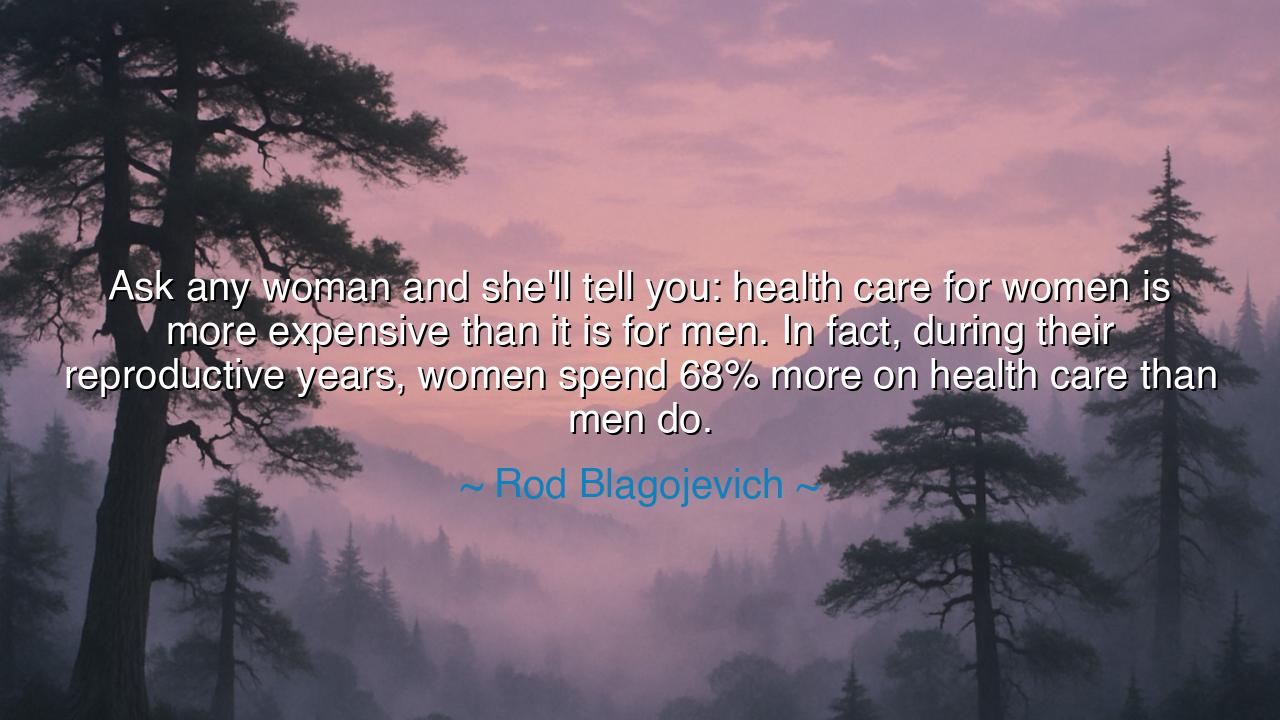
Ask any woman and she'll tell you: health care for women is more
Ask any woman and she'll tell you: health care for women is more expensive than it is for men. In fact, during their reproductive years, women spend 68% more on health care than men do.






The voice of Rod Blagojevich, in a moment of truth that transcends politics, declared: “Ask any woman and she’ll tell you: health care for women is more expensive than it is for men. In fact, during their reproductive years, women spend 68% more on health care than men do.” Though these words belong to the modern age, their meaning reaches back through centuries of imbalance and unheeded suffering. It is a lament and a lesson—a reminder that inequality, even when unseen, can dwell in the most sacred of human needs: the need for healing.
The ancients knew that the strength of a society was measured not by its wealth or its warriors, but by how it treated those who give it life. In the temples of healing in Greece and Egypt, women were revered as both givers and sustainers of life. The goddess Hygieia guarded the health of all, and Isis was called the mother of medicine. Yet through the ages, this reverence was forgotten. As empires rose and fell, the world began to see women not as pillars of vitality but as dependents, their bodies misunderstood, their health dismissed. Blagojevich’s words shine a light upon that long neglect—a modern echo of an ancient injustice.
To say that women spend 68% more on care is not simply a matter of arithmetic—it is a reflection of burden and sacrifice. A woman’s body is a miracle of endurance, carrying the weight of creation, renewal, and care for others. Yet in return, society has too often asked her to pay the highest price. From menstrual care to childbirth, from preventive medicine to recovery, every step of her health journey has been paved with unequal cost. What the law calls “coverage” has too rarely covered her true needs; what the market calls “cost” has too often been extracted from her dignity.
We see this truth not only in the numbers but in the stories of countless women through history. Think of Clara Barton, the nurse who founded the American Red Cross. In the midst of battlefields, she tended to soldiers who would be remembered as heroes, even as she herself was denied the same recognition and medical support. She suffered exhaustion, illness, and financial hardship—yet she persisted, because care was her calling. Her life reminds us that the imbalance Blagojevich speaks of is not new; it is a thread woven through generations, binding women to a role of healer without the honor—or the protection—due to healers.
And yet, there is power in truth once spoken. To name the injustice is to begin its undoing. Blagojevich’s quote is not merely an observation—it is a summons. It calls upon societies, governments, and individuals alike to look with clear eyes upon the inequities that persist even in the realm of healing. For how can a nation call itself healthy when the very hands that cradle its future must struggle for their own care? How can justice live if the mothers, daughters, and sisters of the land bear heavier burdens than their brothers, not through fate but through design?
The ancients would have said that balance is the law of the universe, and imbalance brings decay. So too with human health. To restore fairness in health care, we must remember the sacredness of life itself—the unity of the human family. Equality in healing is not charity; it is justice. It is not a favor granted to women, but a recognition of the truth that when one half of humanity is burdened, the whole suffers.
The lesson is this: a civilization that values health must value it equally for all. Let us, therefore, act with both heart and wisdom. Support the reform that ensures women’s care is not taxed more heavily than men’s. Encourage awareness, speak truth in places of silence, and honor the work of those who tend to life’s beginnings. Let every community remember that fairness in healing is the seed of a stronger, more harmonious world.
For as the ancients taught, and as the modern prophet has reminded us: when healing is unjust, the soul of the people grows sick. But when health care is equal, when the burdens of women are lifted and their needs honored with reverence, then the nation itself rises renewed—stronger, wiser, and whole once more.






AAdministratorAdministrator
Welcome, honored guests. Please leave a comment, we will respond soon